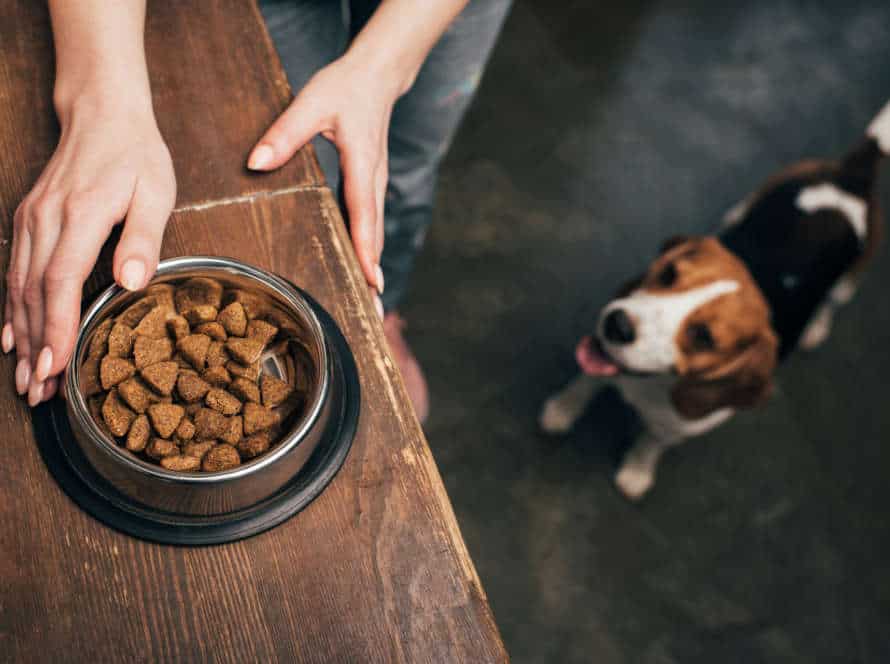The Pros and Cons of Homemade Dog Food: Is it Worth the Effort?
Homemade dog food has advantages and disadvantages. Here are some pros and cons to help you decide if it’s worth the effort.
Pros:
- You choose the ingredients: You know what goes into your dog’s food, so you can avoid anything that could be bad for them.
- Better nutrition: Homemade food is often fresher and includes more whole foods, giving your dog better nourishment.
- Cost-effective: Some recipes may be expensive, but others can help you save money in the long run.
Cons:
- Time-consuming: Preparing homemade food takes time and effort.
- Nutrient imbalance: It’s hard to get the balance of nutrients right, which can lead to deficiencies or excesses.
- Risk of contamination: Not storing or prepping it properly can lead to bacterial contamination.
Pro tip: Get in touch with your vet before changing your pup’s diet, including switching to homemade food. They can tell you what your dog’s nutritional needs are and give advice about homemade dog food.
The Pros of Homemade Dog Food
Homemade dog food can be advantageous for your pup’s health! You have more control over the ingredients, plus you can customize it to your pup’s taste and dietary needs. Let’s examine some of the advantages in depth.
Better Nutritional Control
Homemade dog food is great for nutrition control. Commercial dog food often has fillers, yucky flavors and preservatives. You can control what your pup eats when you make food at home. But, you need to check with a vet and research. You have to plan and prepare carefully – some ingredients can be bad if you use too much. Common recipes have onions and garlic, but these can be toxic to dogs. Protein sources like meat, fish and eggs must be included to get essential amino acids.
Pro tip: Talk to your vet before switching to homemade food. This way you can make sure it has the right nutrition. Also, transition slowly to avoid tummy troubles.
Minimizes Additives in Your Dog’s Diet
Feed your pup homemade grub and reduce the additives in their diet. That leads to a healthier, longer life!
Commercial doggy foods often contain chemicals such as artificial flavors, colors, and preservatives. These can be bad for your pup’s health. By making food at home, you control the ingredients and make sure they get a balanced, nutritious diet without any nasties. You can even tailor the diet to their specific needs or allergies.
Though it may take more effort to make homemade food, the health benefits and assurance of what’s in their food makes it worth it.
Helps Handle Certain Health Issues
Homemade dog food can boost certain health issues in your pup. Canines with food allergies, digestion problems, or other ailments may benefit from a tailored diet that meets their unique nutritional needs. Age, weight, breed, and activity level all play a role in your dog’s nutrition.
With homemade dog food, you can select ingredients and adjust the recipe to your pup’s needs. You can dodge ingredients that cause allergic reactions or digestive issues and add supplements for joint health or immunity. Home cooked meals can also tempt picky eaters and aid with weight control.
But, it’s important to seek advice from a vet or nutritionist before starting your pooch on a homemade diet. They can help you create a healthy and complete meal that meets all of your pup’s nutritional needs. Storage and handling of homemade dog food are also essential for avoiding food poisoning.
Pro tip: Adding variety to your pup’s diet with homemade dog food can keep mealtime fun while providing a range of nutrients.
The Cons of Homemade Dog Food
Feeding your canine homemade food has its pros. But before deciding, weigh the potential cons too. Making homemade dog food is no joke – it’s time-consuming and requires expertise in your pup’s nutritional needs. Here, let’s take a look at some of the drawbacks of homemade dog food so you can decide if it’s worth it.
Nutritional Imbalances
Nutritional imbalances in homemade dog food can be a worry for pet owners. Homemade dog food can be healthier than commercial food, but it may not have all the essential nutrients dogs need.
Here are some common nutritional imbalances to be aware of:
- Protein deficiency: Homemade dog food may not have enough high-quality protein. This is key for building and repairing tissues, as well as producing hormones and enzymes.
- Fat deficiency: Fat is a source of energy for dogs and helps them absorb vitamins A, D, E, and K. But, homemade dog food may not have enough fat. This can lead to dull coats, dry skin, and other health issues.
- Vitamin and mineral deficiencies: Home-cooked diets may not have necessary nutrients like vitamin D, calcium, and phosphorus. These are important for strong bones and teeth.
To prevent these nutritional imbalances, consult a veterinarian or canine nutritionist. They can help you create a balanced diet for your dog that meets their specific needs.
Preparation and Time-Consuming
Preparing homemade dog food can take up time, making it less convenient than commercial dog food. However, there are pros and cons.
The positives are that you can control the ingredients and tailor it to your dog’s needs. You can also avoid preservatives or chemicals that may be harmful.
On the other hand, it can take time and you may need specialized equipment and knowledge to make sure your dog gets a well-rounded diet. Additionally, the cost of buying fresh ingredients for homemade dog food may be more expensive.
Before committing to homemade dog food, think about your lifestyle, resources and your dog’s needs. Embrace the approach, but take the help of experts to make sure your dog is getting all its nutrients.
Cost and Availability of Ingredients
When deciding whether to make homemade dog food, one should consider the cost and availability of ingredients. It can be beneficial, as you know exactly what your pup is eating. However, it is also time-consuming and pricey.
Organic ingredients are usually more expensive than non-organic. Plus, you may have to look around for the ingredients if they’re not easily accessible.
It’s important to weigh the pros and cons. Costs and ingredients must be taken into account before deciding if it’s worth it.
Is Homemade Dog Food Worth the Effort?
Making your own homemade dog food may seem scary. But, there are pluses and minuses to think about.
Cooking homemade meals for your pooch can give them a balanced, nutritious diet and you can decide what ingredients go in. However, there are also downsides, which include the cost, time and potential health risks. Let’s look at the pros and cons of homemade dog food. That way you can work out if it’s worth it.
Factors to Consider Before Making Homemade Dog Food
Making homemade dog food can be a great way to make sure your furry companion eats healthy and nutritiously. But, there are some things to think about first.
Pros:
- In charge of ingredients – Pick what goes in, avoid allergens, and tailor it to your pup’s needs.
- Quality – You control sourcing and prep, meaning better food than what’s sold in stores.
Cons:
- Takes time – Preparing the food can be time-consuming, so it’s hard for busy pet owners.
- Nutrients must be balanced – Careful planning is needed to make sure meals have the right nutrients. Otherwise, health problems can occur.
It’s worth the effort if you have the time, energy, and dedication to give your pup nutritious meals. Talk to a vet to know what your pup needs nutritionally.
Professional Advice on Homemade Dog Food
Homemade dog food has perks, but to see if it’s worth the effort needs careful thought.
Pros:
- Nutrition Control: Making it yourself lets you pick the quality and variety of ingredients. This ensures your pup gets the right balance of nutrition.
- Allergy Prevention: If your dog is prone to allergies, you can leave out troublesome ingredients and stop allergy symptoms.
- Taste Preference: You can tailor meals to your pup’s tastes, so they’ll be more likely to eat and enjoy it.
Cons:
- Time-consuming: Preparing it can take time, which may be too much for busy folks.
- Nutrient Deficiency: Without careful planning, the food could be missing important nutrients.
- Cost: High-quality ingredients can make it pricey.
To sum up, homemade dog food has advantages, but you must think about the pros and cons before deciding if it’s worth the effort. It’s wise to talk to a vet or canine nutritionist before starting a homemade diet.
Balancing Convenience and Nutrition for Your Dog’s Health
Feeding your pup homemade grub instead of store-bought can be more nutritious. But it can also be a hassle. Balancing convenience and nutrition for your dog’s health is possible. It all depends on your lifestyle and time.
Pros of Homemade Dog Food:
- Custom-made diet. You choose the ingredients, so you can pick what your pup likes and what meets their dietary needs.
- Healthier ingredients. No preservatives, chemicals, or by-products which can harm your pup’s health.
Cons of Homemade Dog Food:
- Time-consuming. Shopping, cooking, portioning – it all takes time.
- Nutrient Imbalance. It can be hard to get the right balance of nutrients for your pup.
In conclusion, homemade dog food can be worth the effort if you have the time. Consider asking a vet to help plan a balanced home-cooked diet for your pup.
Frequently Asked Questions
Q: Is homemade dog food nutritionally balanced?
A: Homemade dog food can be nutritionally balanced if it is carefully planned and balanced with the necessary vitamins and minerals. However, it can be difficult to achieve the correct balance, and as a result, store-bought dog food tends to be more nutritionally consistent.
Q: Is it cost-effective to make homemade dog food?
A: Making homemade dog food can be more expensive than buying commercial dog food, as it often requires purchasing a variety of ingredients. However, the cost can be reduced by purchasing ingredients in bulk, and some dog owners believe that the long-term health benefits for their pets outweigh the extra cost.
Q: Can homemade dog food lead to health problems?
A: Homemade dog food can lead to health problems if it is not properly balanced with the necessary nutrients. For example, a diet high in protein can lead to kidney problems, and a diet without enough calcium can lead to bone issues. It is important to consult a veterinarian or canine nutritionist before feeding your dog homemade food.
Q: What are the pros of feeding my dog homemade food?
A: The pros of feeding your dog homemade food include having complete control over the ingredients and quality of the food, tailoring the food to your dog’s specific needs (such as food sensitivities or allergies), and potentially improving your dog’s overall health and energy levels.
Q: What are the cons of feeding my dog homemade food?
A: The cons of feeding your dog homemade food include the potentially difficult and time-consuming process of preparing the food, the risk of not achieving proper nutritional balance, and the potential for the cost to be higher than commercial dog food.
Q: Can I supplement my dog’s commercial food with homemade food?
A: Yes, supplementing your dog’s commercial food with homemade food can be a good way to provide variety in their diet and introduce different nutrients. However, it is important to make sure that the homemade food is nutritionally balanced and that the total amount of food given is appropriate for your dog’s weight and activity level.







